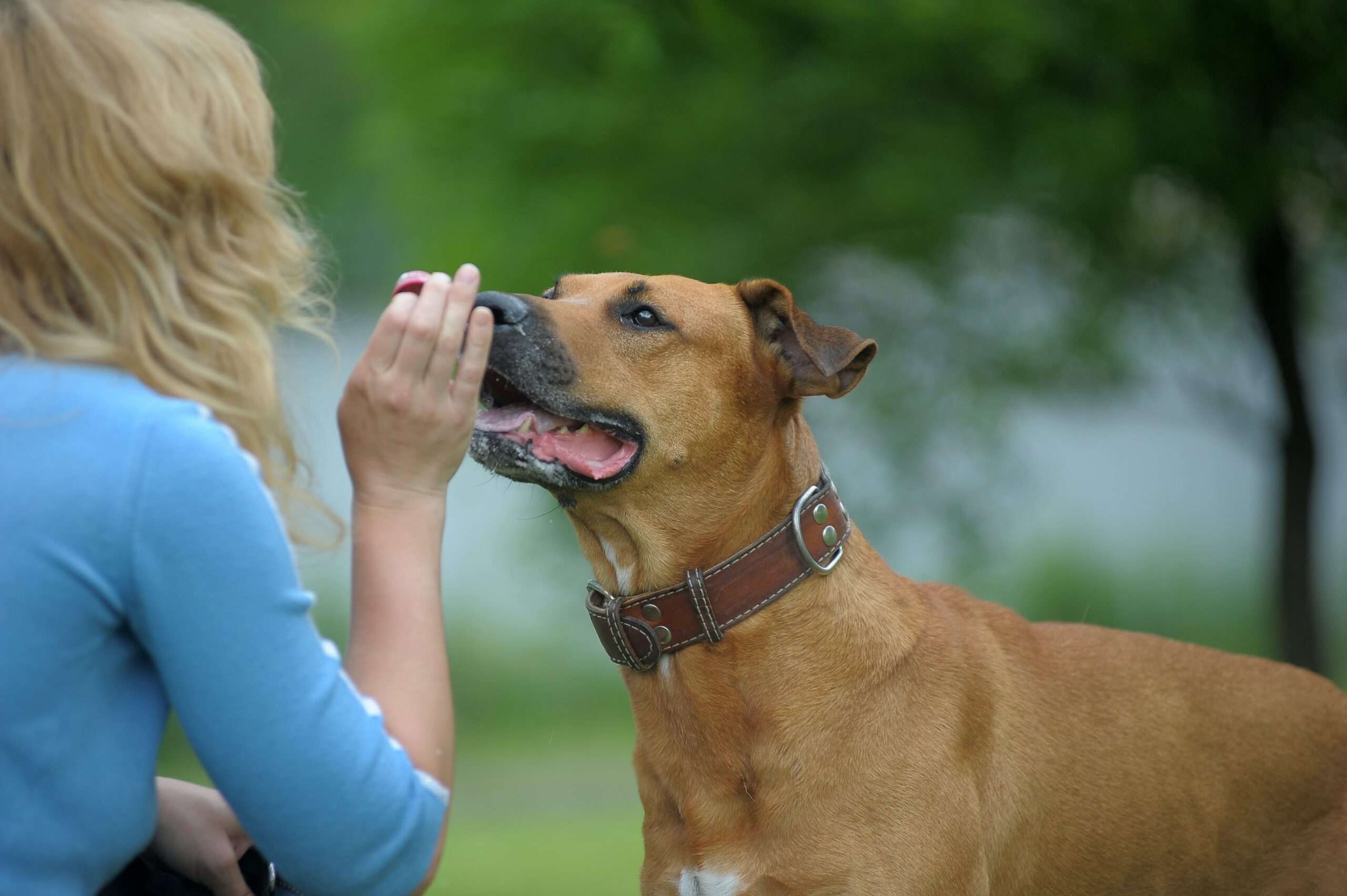How long does pregnancy in dogs last?
Pregnancy in dogs, also called the gestation period, normally ranges from 57-65 days with an average of 63 days.
With a planned breeding, you should record the exact date of mating. If there are two matings, make a note of the dates and expect birth to occur between 63 and 65 days later.
Immediately after my female dog has been mated, is there anything I should do?
Make sure that she does not have the opportunity to mate with any other dogs. Remember that estrus or ‘heat’ will continue for several more days and she could theoretically become pregnant from another dog during this period. After a planned mating, it is a good idea to allow her to rest quietly for a few hours.
Should I change her food?
It is important that she be in good physical condition before she is mated. Both the male and female dog should be examined by a veterinarian prior to mating.
“Discuss nutritional supplements and vitamins with your veterinarian before giving them to your dog.”
After mating, food intake should remain the same during the first two-thirds of pregnancy (approximately six weeks after mating). Make sure you feed your dog a premium, high-quality diet approved by your veterinarian during pregnancy. Discuss nutritional supplements and vitamins with your veterinarian before giving them to your dog. It is recommended that your dog be fed a diet rich in omega-3 fatty acids (DHA) while pregnant to help puppy development in utero, and also during milk production.
What do I do after the sixth week?
After the sixth week of pregnancy, your dog should gradually increase her food intake; high energy, low fiber foods are recommended. As the fetuses increase in size, abdominal pressure increases and frequent small meals are advised. Diets containing high levels of omega-3 docosahexaenoic acid (DHA) have been shown to improve the health and development of puppies and should be considered. Discuss DHA-supplemented diets for your pregnant dog with your veterinarian.
During the last three weeks of pregnancy, your dog’s food intake should increase by up to one and a half times the normal level, by feeding smaller meals more frequently.
What about medications that my dog takes?
Some commonly used medications should be avoided while your dog is pregnant. Contract your veterinarian to discuss the use of any supplements and medications.
How can I be certain my dog is pregnant?
Early pregnancy detection in dogs can be extremely difficult. A blood test can detect pregnancy in dogs by measuring the hormone relaxin; however false negatives can occur if the test is performed too early in the pregnancy, or if the dog is carrying only one or two puppies (see handout “Pregnancy Testing in the Dog”). A positive test indicates that the dog is pregnant at the time of the test, but does not mean that the pregnancy will be successful. A veterinarian can perform a trans-abdominal palpation (feeling the abdomen for an enlarged uterus or for individual fetal swellings) at about three to four weeks after mating, but the results are variable. In some cases, results depend more upon the relaxation of the female dog than upon the experience of the veterinarian.
Abdominal ultrasound is currently the method of choice for pregnancy diagnosis. Depending on the equipment and patient, a positive diagnosis can be made as early as three weeks. Most scans performed after day 28 of the pregnancy are reliable. Due to positioning within the abdomen, it can be difficult to count the number of fetuses on an ultrasound with accuracy. An abdominal radiograph (X-ray) during the last two weeks of pregnancy, generally around week seven, is the most accurate method for determining litter size and should be performed on all pregnant dogs so that you will know when your female is finished having puppies.
Should I change her routine as pregnancy advances?
As pregnancy progresses, intra-abdominal pressure increases and so does the mother’s food requirements. The dog usually needs to have an increased number of smaller meals rather than an increased quantity per meal. Let your pet decide how much physical activity she needs. This depends on the number of puppies and the amount of intra-abdominal pressure she is experiencing. Do not over-exercise a pregnant female. Check for any vaginal discharges and contact your veterinarian if you have any concerns.
Few things pull on a human’s heartstrings like a litter of snuggly pups. Though undoubtedly adorable, with puppies comes big responsibility. Vet care, cleaning up after them, and feeding them can really cut into the family budget (and your free time). Breeding a dog is a lot of work and something most pet parents would prefer to prepare for. After all, caring for a pregnant and nursing dog, then adding 6 to 8 puppies (or more) to the mix, is a lot to take on. Not to mention that every pregnancy carries complication risks, even if the dog has a history of healthy births in the past.
Unfortunately, accidents do happen. In-heat dogs sneak out and link up with neighborhood dogs and often end up pregnant as a result. But there are some things you can do to prevent puppies after mating.
Spaying
When in heat, female dogs release pheromones to attract males, and males may travel considerable distances just to mate. Mating happens quickly, and the whole process can take as little as 10 minutes, often without pet parents even noticing it. Some parents don’t realize what has happened until their dog’s body starts changing. So what is a pet parent to do when they notice their pet’s tummy growing?
The first option to prevent puppies after mating is to spay the dog. Spaying is a minimally invasive surgery where a vet removes a dog’s uterus and ovaries. Vets can still perform the spay even if the dog is in early pregnancy, removing the fetuses along with the reproductive organs. Spaying during pregnancy carries a greater risk of surgical complications, is more invasive, and often costs more than a regular spay procedure. However, sterilization has a 100% efficacy rate and will ensure your dog never gets pregnant again.
Injections
Most dogs, given the opportunity, will end up mating when the female is in heat. A whopping 40% of female dogs will fall pregnant after just one mating session! That incredibly high number means you are at considerable risk of having a litter of unwanted puppies if you are not careful. Thankfully, there are relatively safe means to prevent pregnancy after mating.
One such option is known as a ‘mis-mating injection.’ If you suspect your dog mated in the last 22 days, then an injection of Alizin, an antiprogestagenic compound, may be an option. This medication will terminate the growing cluster of cells inside your dog and is 100% effective within 22 days of mating. It can also be administered later in the pregnancy, but it is less likely to be as effective.
Injections are an effective preventative measure to take, especially if given early. However, this is not a long-term solution, and it will not offer protection from pregnancy in the future. If you are looking for a long-term solution, we recommend spaying your dog.
Veterinary Abortion
Male dogs can be extremely persistent when it comes to female dogs in-heat, and they are not above breaking into kennels or digging under fences! Even responsible pet parents with big breeding plans can face unwanted pregnancies. If spaying and mis-mating injections are not an option, a veterinary abortion is a viable, effective way to terminate an unwanted pregnancy.
However, choosing to go through with an abortion is a big medical decision to make for your dog. Abortion carries more risks for complications than spaying or mis-mate injections. Most vets won’t perform them unless the dog is too far along for other options, and pregnancy is not feasible (either for health or personal reasons). Depending on how far along the dog is, vets may choose a surgical abortion or terminate pregnancy with abortifacient medications.
Abortions are tough on a dog’s body, and dogs often need to stay in the animal hospital for up to a week while they recover. Abortions are also expensive to perform, especially if the dog is late-term, and it won’t offer any protection against future unwanted pregnancies like spaying will.
Effects of Preventing Pregnancy in Dogs

Pregnancy prevention has many benefits for both pets and their pet parents. A litter of puppies is a tremendous responsibility. You’ll have to clean up their accidents, take them for their first vaccinations, deworm them, wean them, and keep them safe for at least the first 8 weeks of their life. Plus, you’ll still have to look after their nursing mother and find the puppies’ homes in the meantime.
Pregnancy can also put a lot of strain on a dog’s body, and some dogs may be at higher risk of pregnancy complications due to age, size, or breed. Plus, caring for a pregnant mother and her puppies is time-consuming and costly. Preventing pregnancy can spare your family from those financial burdens and extra work that comes with puppies and eliminate the risks of pregnancy-related health conditions in your pet.
If you choose to proceed with your dog’s pregnancy, check out our pet insurance comparison tool. Caring for a pregnant or breeding dog can be expensive, and most accident and illness policies don’t cover costs related to pregnancy. But some providers, like Trupanion, offer add-ons that reimburse vet care costs.
Take Home Points
Dogs are sneaky when it comes to mating, and dogs can become tied up in the blink of an eye. Even vigilant pet parents can find themselves faced with an unwanted pregnancy. But fortunately, there are several options available to these parents, especially if they catch the pregnancy early on.
Spaying is an excellent option during early pregnancy and will prevent pregnancy for the rest of your dog’s life. Pet parents who intend to breed their dog in the future may prefer to go the mis-mate injection route since this will end the pregnancy but not make the dog infertile. However, mismating injections are only effective during a narrow window of time, so this isn’t a viable option if it’s been longer than 22 days since the mating session. Finally, a veterinary abortion should only be used as a last resort, as it will put serious stress on your beloved dog.




